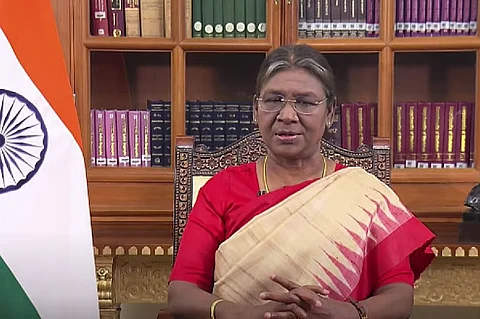

Follow TNM's WhatsApp channel for news updates and story links.
President Droupadi Murmu, on Tuesday, May 13, referred 14 constitutional questions to the Supreme Court of India under Article 143 (Power of President to consult Supreme Court), asking the top court to provide its opinion on a range of issues including whether courts can impose timelines on Governors and the President to act on Bills passed by State legislatures.
The Presidential reference comes in the wake of the Supreme Court's April ruling in the Tamil Nadu Bills case, where the court held Governor RN Ravi’s withholding of 10 Bills as "illegal and arbitrary", and directed that assent decisions must be taken within three months.
In the letter addressed to the Supreme Court, President Murmu asked: “What are the constitutional options before a Governor when a Bill is presented to him under Article 200 of the Constitution of India?”
Article 200 of the Constitution of India deals with the powers of a Governor with respect to Bills passed by the State Legislature. When a Bill (except a Money Bill) is passed by a State Legislature, it is sent to the Governor for assent. Under Article 200 of the Constitution, the Governor can either give assent, withhold it, return the Bill for reconsideration (if it's not a Money Bill), or reserve it for the President’s consideration.
Another question by the President is: “Is the Governor bound by the aid & advice tendered by the Council of Ministers while exercising all the options available with him when a Bill is presented before him under Article 200?”
She also sought clarity on whether the Governor’s discretion under Article 200 and the President’s discretion under Article 201 (procedure when a Governor reserves a Bill for the President’s consideration) are subject to judicial review, and whether the immunity under Article 361 (immunity to the President and Governors from legal proceedings during their term of office) bars such scrutiny.
The President further asked: “In the absence of a constitutionally prescribed timeline and the manner of exercise of powers by the President, can timelines be imposed and the manner of exercise be prescribed through judicial orders for the exercise of discretion by the President under Article 201?”
This move comes after the apex court, through a bench comprising Justices JB Pardiwala and R Mahadevan, held that a Governor cannot reserve a re-passed Bill for Presidential consideration and must act within a three-month period. The court had also ruled that the President must communicate reasons for their decision to the state government.
The judgement suggested that in matters involving constitutional interpretation, the President should consult the Supreme Court through an Article 143 reference. President Murmu’s letter appears to be a response to this observation.
The reference also asks whether decisions by the Governor and the President under Articles 200 and 201 can be challenged before the law comes into force, and whether courts can review the contents of a Bill prior to its enactment.
This constitutional development follows comments made by Vice President Jagdeep Dhankhar, who criticised the judiciary’s use of Article 142, likening it to a “nuclear missile” against democratic institutions.
The questions posed by the President to the apex court signal a potential redefinition of the balance of power between the legislature, the executive, and the judiciary. The Supreme Court’s opinion on this Presidential reference is now awaited.